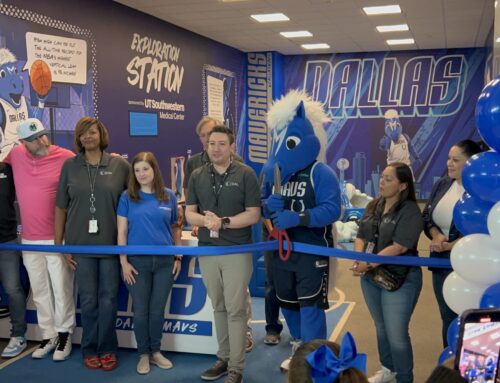Something strange was afoot at Woodrow Wilson High School.
Every spring, when the district’s window for transfer applications opens, the well-regarded East Dallas school receives hundreds of requests. Woodrow is overcrowded, however, so many of those transfer requests are turned down.
Some parents are determined to get their children in, however.
“You see the same family apply for a transfer, get denied, and come back a week later with a notarized affidavit,” says DISD Trustee Dustin Marshall, who represents Woodrow and worked with parents at the school to modify the district’s transfer process.
Marshall and the parents found that Woodrow has roughly 180 affidavits on file for students who attend the high school. These affidavits are a one-page legal document signed by a notary public, attesting to a student’s place of residence within the school’s boundaries.
“Affidavits have been a concern for a long time,” says DISD Trustee Audrey Pinkerton, who represents Oak Cliff. “On one hand, the district uses them to accommodate impoverished families who are living with relatives or friends and who don’t have utilities or leases in their own name. On the other hand, unscrupulous families find them an easy way to circumvent attendance boundaries.”
One popular school in Pinkerton’s district, Rosemont Elementary, had 86 affidavits on file in December 2015, according to meeting notes from the DISD Attendance Boundary Assessment Committee, which was considering a change to Rosemont’s boundaries.
“When you have an affidavit, you’re not producing proof like a rental agreement or a water bill, and as far as we can tell, there’s no check-up done on that,” said longtime committee member Beth Weller at a January board briefing. “We don’t need this loophole with no checks and balances.”
Parents at Greiner Middle School, also in Oak Cliff, made an effort to crack down on false affidavits years ago, Pinkerton says.
“Parents reviewed the affidavits and found that many families listed Greiner as their home address,” Pinkerton said.
Greiner also houses the district’s arts magnet for middle-schoolers. Board policy allows magnet students to use affidavits as proof they live within Dallas ISD boundaries. Ben Mackey, principal of the district’s nationally renowned Talented and Gifted (TAG) high school, says he personally checks suspicious utility bills and apartment leases before admitting students into his school.
Affidavits, however, are legal documents, and therefore principals can’t call them into question.
In Woodrow’s case, the same notary public’s signature is on a number of the affidavits on file, some of which are known to be fraudulent, Marshall says. Yet the students with affidavits are admitted and show up in district data not as transfers but as attending their home school. Similarly, any magnet students using false affidavits would be identified as in-district residents rather than out-of-district students.
All of these anecdotes led us to ask the district for copies of affidavits on file at schools in both the neighborhoods we cover and at several sought-after magnet schools, as well as numbers of annual affidavits going back to the 2010-11 school year. The district responded with an estimated charge based on the time it would take to fulfill our request — $23,761.
The eye-popping price tag was based on the fact that neither the schools nor the district have any idea how many students are using affidavits to attend its schools, either this year or any previous year. The situations of Woodrow, Rosemont and Greiner were better-known to parents because they raised concerns, but affidavits “are not legally required to be retained from year to year,” the DISD office of legal services stated in an email, and because “each record will need to be manually handled and counted,” the district estimated “up to 120 hours per campus” — and the accompanying $15 an hour for personnel time spent — to search through student files.
The Advocate couldn’t afford the estimated $23,000 — or even the thousands of dollars we were quoted to review affidavits from a single school — so we couldn’t pursue the request further. But as a result of Marshall’s work on the district’s transfer process, the district will no longer be accepting affidavits as proof of residency.
Elizalde told trustees in April that Dallas ISD is the only school district in the state using affidavits. Others utilize the federal McKinney-Vento act to accommodate homeless students; the act ensures transportation and the ability to stay at the student’s home school, regardless of where they reside.
“I tried to remember why that fence was built, as Dr. Hinojosa reminds me to do,” Elizalde said of affidavits. “The best I can figure [is] this was supposed to help decrease the number of students that were transferring … but if we have no space at that school, and we’re having them jump through hoops, it really doesn’t make sense.”
The elimination of affidavits will apply not just to neighborhood school transfers but to choice and magnet schools as well, district officials said. In addition, starting with the 2017-18 school year, Elizalde is centralizing magnet residency checks in an effort toward consistency across the campuses.
“Once we relinquished it to the campuses, [in 2012] there was no oversight,” Elizalde said. Starting next year, Keisha Crowder-Davis, DISD’s director of postsecondary success, will monitor students’ proof of residency, both initially and year-to-year, “so we can manage the process of who’s next on the list from a central location,” Elizalde said.
The decrease in out-of-district numbers may not be drastic. After all, anyone attending a DISD magnet using a falsified affidavit is currently in the system as an in-district student. But since DISD doesn’t know how many students are attending its schools using affidavits — whether authentic or fraudulent — the impact could be larger than the data shows.
To learn more about Dallas ISD’s magnet school admission shortfalls, as well as the district’s new emphasis on choice schools, check out the other stories in this series:
• How many kids are cheating their way into Dallas ISD magnet schools?
• Shrewd families are scheming a Dallas ISD program for homeless kids
• Which students add more value to magnets: Dallas kids or Plano kids?
• Rich + white + suburban students » Dallas magnet schools ≠ diversity
• DISD’s poorest students face long odds to attend magnet schools
And don’t forget to read our December cover story that launched a deep dive into these issues.
Parents or students with questions about the magnet admission process or concerns about fellow students attending schools without proper documentation can contact Keisha Crowder-Davis at 972.925.6710 or magnetschools@dallasisd.org and can copy us at kmitchell@advocatemag.com.






